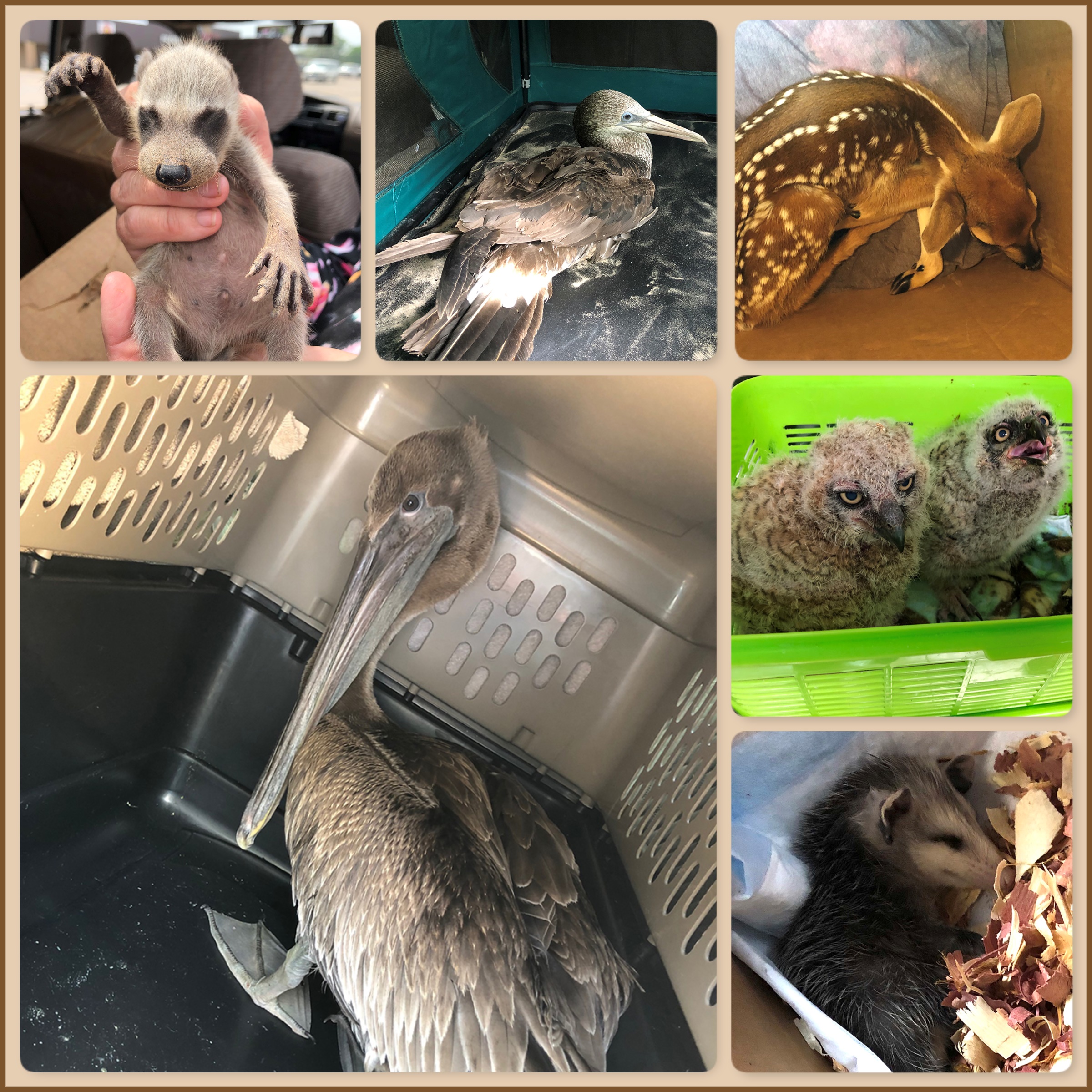I know.
I know that this will get better—this masked, COVID-19 isolation after seventeen years in a desolate bubble.
I know because I began to break that bubble in the last two years and walk a path of personal growth.
I began to rescue and transport animals in my community in 2018. In the collage above are (clockwise from top left: baby raccoon, immature Northern gannet, White-tailed deer fawn, Screech owlets, baby opossum, and immature Brown pelican).
By the spring of 2019, I had done several transports and releases. Transportation of smallish wild animals is fairly straightforward: go to someone’s home or business, scoop up a box, get a form filled out by said person, and drive the animal to the rehabilitator. All this is done with minimal contact with people.
Rescue, on the other hand, was nerve-wracking at first. I had no formal training and the one rescue I’d helped with was that of a sick and weak pelican that wasn’t up for a fight. Complicating matters, I have always been shy and called myself an introvert. I was uncertain how future rescues would go if I was working without a fellow rescuer.
On my first solo pelican rescue, the pelican was hungry and wanted my shad. I lured her in and grabbed her. Other pelican rescues were a mixed bag. Some went great (for me, not so much for the bird). Some failed entirely as the birds could still fly enough to escape even four or five well-intentioned, but sometimes intimidated, helpers I recruited on the beach.
But always, if there are people on the beach, I have learned to recruit. I’ve done so with other sea birds and Black vultures, as well. In so doing, I’ve learned I’m no introvert. I am shy, yes, but I actually like working with and getting to know people.
In turn, people are almost always willing to help even if they find the larger birds a bit frightening. I am not prideful. I don’t have to do things myself to prove that I am capable or special.
If a large bird can’t be lured, it sometimes has to be rounded up by several of us like closing purse strings. We try to do this quickly to reduce stress on the bird. Sometimes an injured bird can be flushed toward me by one or two helpers so I can grab it easily. Sometimes, it’s just helpful for someone to distract a sickly, scared gannet so I don’t lose a finger.
Other times, rescues fail and the bird flaps away. The bird will either heal on its own or it will get worse and we may catch it later.
Whatever the circumstances, I always prefer to work with people nearby. This makes them feel good, teaches them about the animals, and gives me a better chance for success. It also connects me to the community. We have a cheerful exchange as they bubble with the excitement of having helped a little furry or feathery life and I love seeing them brighten with joy and pride.
In all rescues, I treat the animals in need of being saved and the “recruits” with respect, and I work to gain the trust of both.
We all, volunteers, me, and animals, must work together.
In recent years I have sought personal autonomy (self-government) and some in my life have interpreted this as a need on my part to do everything single-handedly.
I don’t want to stand alone.
I don’t want to walk this life without support. I simply want the right to choose when, how, and who I ask for support.
If I am lonely or hurting, I would like all the normal things lonely, hurting people need: affection, attention, and someone who has my back.
If I am angry, give me space. My spicy language will provide you with a clue and I may say outright, “I’m angry. Back off.”
If I’m grieving, well, grief is a strange monster. I’ve been dealing with a great deal of grief in the last several years. I have tried to communicate my needs. I have sometimes succeeded and sometimes failed. People have sometimes just failed me.
Grief has at times closed me off to people and yet opened me up to rediscovering who I used to be.
I can tell you it is harder to know how to help the grieving. I can tell you that leaving someone to flounder in their grief is not a solution, nor is making promises you can’t keep.
I can tell you that I give what I get: Respect, trust, honesty, love, and friendship.
Respect. Trust. Honesty.
Sometimes, as I grieve now, it seems I am the bird healing myself or waiting for things to get bad enough to be caught. Perhaps I just need to be distracted (socialized) so someone can grab me and help me. Probably, it is a bit of both.
I’m still learning how to socialize my shy self after many years of being hidden and wounded. I will figure it out—with help—even if I must do it with a mask on.
I know.
Last Updated on March 17, 2023 by Lee Ellis


